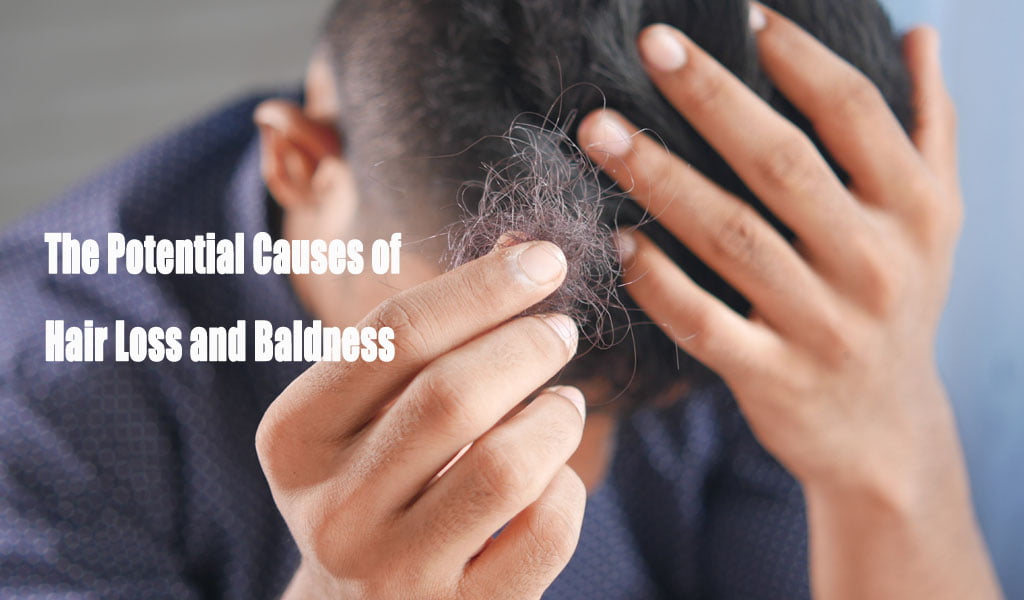The loss of hair and baldness could cause stress for both genders. Whether it’s due to genetics, stress, or other reasons, loss of hair can impact our self-esteem and confidence. In this article, we’ll look into the potential causes of hair loss and baldness. we are starting with common causes such as aging and genetics, to less-known causes such as the autoimmune disorder and nutritional deficiencies.
What are the potential causes of hair loss and baldness? Let’s discover.
Genetics: The Most Common Cause of Hair Loss
If you’ve been looking at your grandparents or parents and thought about whether they’d have baldness as well You’re not alone. Genetics is the most frequent reason for hair loss, being responsible for as much as 90 percent of male pattern hair loss instances. Women too can suffer from the loss of their hair due to genetics, however, it is less frequent and usually manifests differently.
The loss of hair due to genetics occurs through an interaction of hormonal and genetic factors. In particular, a reaction to dihydrotestosterone (DHT) the hormone that is derived from testosterone causes hair follicles that shrink to ultimately stop producing hair entirely. This kind of loss tends to be gradual and usually begins at the temples or on the crown of the head. It then spreads across other areas.
Other Potential Causes of Hair Loss and Baldness
Although genetics is a major cause of hair loss but it’s not the only cause. There are other possible factors that can cause hair loss as well as baldness that you should be aware of:
Aging: As we get older our hair naturally thins and loses its luster. This is because of an increase in the size of hair follicles, and less production of melanin, which is the pigment that gives hair its color.
Hormonal imbalances: Hormonal imbalances like those that happen during menopause or pregnancy are also a cause of loss of hair. Conditions such as polycystic ovarian syndrome (PCOS) and thyroid disorders can alter hormone levels, leading to loss of hair.
Nutritional deficiencies: Certain vitamins and minerals such as iron zinc as well as vitamin D are vital to maintain healthy growth of hair. Deficiency of these nutrients could cause hair to become dry and thin.
Stress: Stress can cause a condition called telogen effluvium, which is characterized by excessive hair shedding. This kind of loss tends to be temporary, but it can be reversed using strategies for managing stress, such as exercise and meditation.
Medicines: Certain medicines including chemotherapy drugs and blood thinners may lead to hair loss as a side effect. This kind of loss tends to be temporary and will return after the medication has been stopped.
Hairstyles: Tight hairstyles such as ponytails and braids can lead to hair loss because of strain and tugging on your scalp. This kind of loss, referred to as traction alopecia is generally prevented by avoiding hairstyles that are tight and choosing looser, more relaxed options.
FAQs: Answering Your Questions About Hair Loss
Can the loss of hair be reversed?
In some instances hair loss can be prevented by taking treatment. For instance, loss of hair due to nutritional deficiencies could be reversed through supplements or changing your diet. However, the loss of hair due to genetics is generally permanent and cannot be reversed.
How can hair loss be stopped?
While it isn’t possible to completely prevent loss of hair, however, there are actions you can take to lower the risk. It’s about eating a nutritious diet that is rich in vital vitamins and minerals as well as avoiding tight hairstyles and decreasing stress.
Could hair loss be an indication of a more serious health issue?
In certain instances, hair loss may be a sign of an underlying health problem like a thyroid disorder or an autoimmune disorder. If you’re experiencing hair loss along with other symptoms, it’s crucial to consult your doctor in order to identify any other underlying health problems.
Conclusion
Hair loss and baldness can be frustrating and upsetting. However, knowing the possible causes will help you make the necessary changes to reduce your chance of suffering. Although genetics is the most frequent cause of losing hair, additional causes such as nutritional deficiencies, hormonal imbalances, and stress may be a factor.
If you take steps that improve overall health and well-being it will help to keep your hair strong and healthy. If you’re experiencing loss of hair It’s crucial to speak with your doctor about the root cause of the problem and then find suitable solutions. If you take the proper strategy, you’ll be able to maintain your hair healthy and beautiful for a long time to come.
You May want to know What Does Healthy Hair Look Like?

